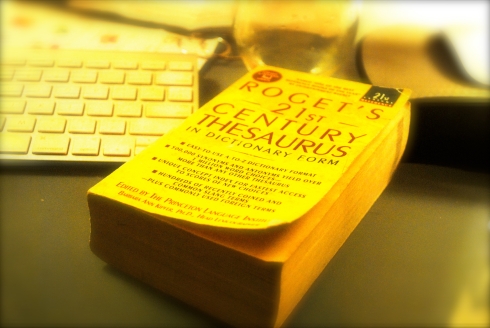One of my most beloved teachers, who has had much influence on my writing – the incomparable Janet Fitch – always challenged our class to write above par. That meant exercising a few things – banning the cliche, shaping characters who evolve, and using colorful words (check out her Rules for Writers – great list!).
Words. Bending them and stretching them and applying them in ways that hadn’t been done before.
I’d always been ashamed to admit picking up a thesaurus, as if this was the action of an amateur, someone who needed help with expressions. Janet, however, empowered its use, holding it up as an invaluable and irreplaceable tool for writers. Since school, I’ve embraced the thesaurus and other sources of less oft-employed words as a means to assist me with creating prose (I did want to say “and make it pop,” but how cliche would that be?).

With time, I’ve made it a goal to learn new words and integrate them into my writing. My “Groovy Word List” in its most rudimentary form exists in a mini spiral notebook that I keep in my purse, jotting down words I find exceptional, humorous, and unexampled. It excites me when I encounter words with very specific meanings (such as defenestration: the act of throwing something or someone out of a window) or ones that feel nifty when spoken (like cymotrichous: having wavy hair) or a word that replaces a regular old description of something (glaucous means light bluish-green or greenish-blue). How lovely it is when, after compiling words, an opportunity arrives during my writing when I am able to use one of my words. This is especially helpful when editing, when while re-working text, I can replace ordinary words (run, felt, make, sad, sure) with groovy words (dart, thumbed, dragoon, cheerless, inerrant) – even if it means readers have to look them up; even if it means I have to look the words up myself months later because I’ve forgotten the meaning. And this doesn’t mean overdoing it. Swapping out humdrum words for exciting ones is sort of an art form. When using my groovy words, there’s a balance so that the groovy words don’t create a clunkiness, making the writing difficult to read; but in a way to keep the prose from getting stale, the way jewelry can perk up an otherwise dull ensemble.
Therefore, I’ll be sharing some of my more invigorating finds here. Feel free to send any groovy words you come across my way.
mammothrept: n., a child raised by its grandmother; a spoiled child